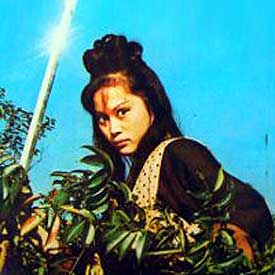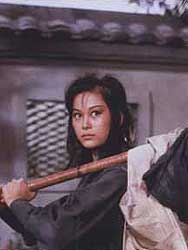 Some of my fellow wuxia fans hate it when I say it, but I tend to prefer jidai-geki or samurai films over wuxia because such a high percentage of samurai films strive for realism & sorrow both in storyline & swordplay.
Some of my fellow wuxia fans hate it when I say it, but I tend to prefer jidai-geki or samurai films over wuxia because such a high percentage of samurai films strive for realism & sorrow both in storyline & swordplay.
It's often said, by many a critic, that King Hu is "the Akira Kurosawa of Hong Kong" because any kung fu film that rises above the genre norms has to be compared to jidai-geki for the finer measuring rod.
Secondarily any wuxia director who strives for seriousness of art will be compared to King Hu, as is often the case with Yuen Feng, director of The Young Avenger (Xiao du long, 1972).
He was a director from "way back" & a veritable pioneer in the "new" realism jumpstarted by King Hu, a "new" form that is today called "old school" since it pretty much was a wuxia attitude that lasted from 1966 to 1979 before the so-called "new wave" came along with its fast-edit high-camp tomfoolery.
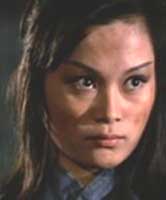 Shih Szu in the title role makes a spectacular swordswoman with her shocking agility & all-round beauty. She was to be greatly associated with this sort of role after her incredible performance in The Lady Hermit (Zhong kui niang zi, 1971) in which she co-starred with the greatest of the great swordswomen stars, Cheng Pei-pei. Shih Szu in the title role makes a spectacular swordswoman with her shocking agility & all-round beauty. She was to be greatly associated with this sort of role after her incredible performance in The Lady Hermit (Zhong kui niang zi, 1971) in which she co-starred with the greatest of the great swordswomen stars, Cheng Pei-pei.
Inspired by the "new" style of King Hu, there is very little wire-fu. Instead, there is an attempt to make the swordplay a bit closer to realistic. For this reason it's great for action, & Shih Szu is one of the most compelling of cinematic swordswomen, permitted to convey conviction & competence.
The Young Avenger is not quite perfect, as it relies on the oldest plot in the book. Plus she is mistaken for a boy early in the show, fat chance of that.
On the other hand, a lot of wuxia is jam-packed with rapidly-spoken extrapolative dialog & convoluted plots such as sometimes make these films gawdamn annoying, especially when at heart they're just revenge pieces & should've been simple. Director Yueh Wang well knew to keep the story streamlined & direct & not pretend confusion is the same as originality.
Shih Szu's lithe swift sureness with swords allows long camera shots -- none of that cheating rapid-edit nonsense used to disguise the fact that some actors have no such physical skills. Her weapon is a beautiful canesword that had once belonged to her father Li Kui (Lam Tung; or, Lin Tong), whom she will eventually avenge during an autumn festival.
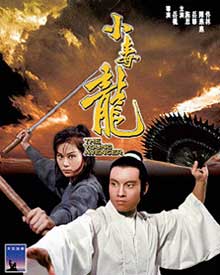 The key villain is the hunchback Liu Tuo (Mei Sheng Fan) skillful at kung fu despite the turtle on his back. Years before, this sneaky hunchback tried to cajole lessons in the Piercing Dragon Style from Master Li Kui. But Li Kui preferred the once-famous form to die with him, due to its potential for misuse. The key villain is the hunchback Liu Tuo (Mei Sheng Fan) skillful at kung fu despite the turtle on his back. Years before, this sneaky hunchback tried to cajole lessons in the Piercing Dragon Style from Master Li Kui. But Li Kui preferred the once-famous form to die with him, due to its potential for misuse.
Indeed, the greatest warriors of the previous generation were now retired, barely teaching their forms to anyone, because of men like Liu who could not restrain themselves when so empowered.
That is why "the Four Heroes of Jiang-nan" (the martial world) had all retired without founding martial schools of their own. The Master of the Golden Spear became a farmer; the original Master of the Iron Fan became a bookworm & scholar; the Mad Monk (Shen Chan) entered a monastary; & the Li Kui the Dragon Piercing warrior is now just a humble schoolteacher.
Liu obliges the old sifu in his desire to die together with his fighting method by giving him a slow-killing Iron Palm blow in the back, a technique that weakens the heart & has no remedy.
On his sick bed the old sifu has given his daughter Bao Zhu her primary inheritance, his canesword, & sent her to a temple to be raised & trained by the only other person who knew the Piercing Dragon style. The "mad monk" taught Bao Zhu for ten years before she returned home, taking odd jobs as an assassin for hire until she gets the opportunity to avenge her father on hunchback Liu.
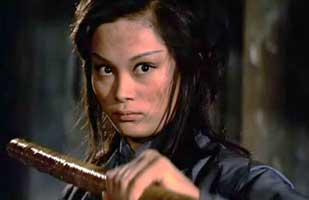 Bau Zhu didn't mind leaving the world for training in the monastary, though even as a child she was sad to think she might never see her playmate again, a young lad who became a scholar studying under one of the former Heroes of Jiang-nan. That childhood pal grew up to be the new master of the Iron Fan.
Bau Zhu didn't mind leaving the world for training in the monastary, though even as a child she was sad to think she might never see her playmate again, a young lad who became a scholar studying under one of the former Heroes of Jiang-nan. That childhood pal grew up to be the new master of the Iron Fan.
When Bao Zhu returns as the Young Avenger, she is reunited with Chen Shih Lun, played by Hua Yueh, generally the hero type, seen also in Come Drink with Me (Dai zyu zi, 1966) opposite Cheng Pei-pei.
The climax is extended swordplay & even the Mad Monk shows up for a bit of empty-hand spice to Bau Zhu's sword action & Chen's iron fan action. The camera work is so good, the choreography so pleasing, that it's truly a fun pay-off. But of course there's never any question who will win, so there's not much in the way of emotion or suspense.
So I would not ultimately compare it too favorably to King Hu let alone to the best of jidai-geki. Still, with the high percentage of wuxia that is mere high camp, the more sincere films like The Young Avenger are to be appreciated for their sense of valor & the overall beauty.
copyright © by Paghat the Ratgirl
|
